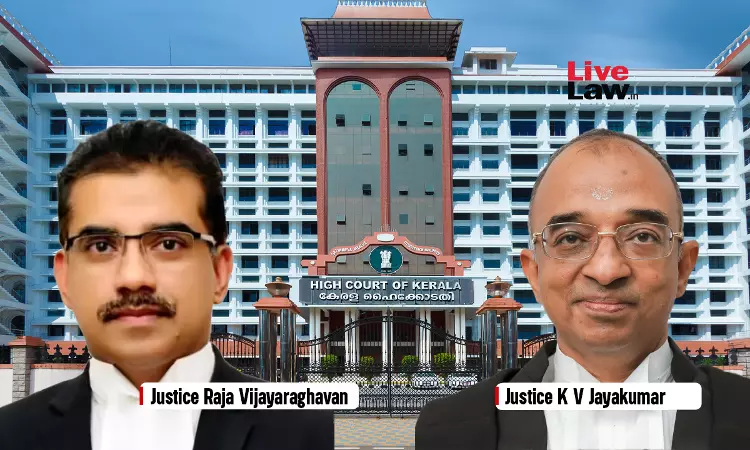- Home
- /
- High Courts
- /
- Kerala High Court
- /
- 'Written Complaint Essential For...
'Written Complaint Essential For Adjudicating PoSH Cases, Labour Disputes Not Covered Under Act': Kerala High Court
Anamika MJ
2 Sept 2025 3:35 PM IST
The Kerala High Court has reiterated that proceedings under the Sexual Harassment of Women at Workplace (Prevention, Prohibition and Redressal) Act, 2013 (POSH Act) cannot be initiated without a written complaint and that disputes of a purely labour nature do not fall under the Act's framework.A division bench of Justice Raja Vijayaraghavan V and Justice K V Jayakumar dismissed a writ...
The Kerala High Court has reiterated that proceedings under the Sexual Harassment of Women at Workplace (Prevention, Prohibition and Redressal) Act, 2013 (POSH Act) cannot be initiated without a written complaint and that disputes of a purely labour nature do not fall under the Act's framework.
A division bench of Justice Raja Vijayaraghavan V and Justice K V Jayakumar dismissed a writ appeal, affirming a single bench decision that quashed the finding of the Local Level Committee constituted under the POSH Act, and a subsequent communication from District Collector, Thiruvananthapuram.
“The oral statement made before the Committee, after distancing herself from the original anonymous complaint, cannot be accepted as a substitute for the written complaint contemplated under Section 9 of the POSH Act,” the bench said.
Background
The case stemmed from a dispute involving the first respondent, who is the Managing Director of Amstor Information Technology (India) Pvt. Ltd, and a former employee who alleged workplace harassment. The appellant was terminated from service on 07-11-2017. The appellant approached the Labour Court and challenged the termination order. Thereafter, the first respondent instituted a suit before the Munsiff's Court, Thiruvananthapuram, seeking to interdict the appellant from trespassing into the office of the Company. In the meantime, a complaint was forwarded to the District Collector, raising certain allegations against the first respondent. A Local Level Committee was constituted under the POSH Act. After an enquiry, the Committee has recommended the first Respondent to apologise, pay 19 lakhs as compensation, and establish an internal complaints committee. Acting on this report, the District Collector issued a compliance directive.
The respondent approached the High Court, arguing that the proceedings violated the provisions of the PoSH Act and principles of natural justice. The single judge found that the complainant had not filed a written complaint as mandated under Section 11 and 12 of the Act and had admitted the same during the inquiry. The Court further noted that the allegations, were in the nature of labour disputes rather than sexual harassment as defined under the law. The Court also noted that the first respondent was not given an opportunity to cross-examine the appellant and the witnesses whose statements were relied upon by the Local Committee. This, the Court observed, was a violation of principles of natural justice.
The counsel for the appellant, submitted that the mere fact that the appellant had approached the Labour Court is no reason as to why she was denied the benefits under the POSH Act. It was further submitted that when the first respondent has an alternate remedy under the POSH Act, it is not for this Court to intervene under Article 226 of the Constitution of India.
The division bench held that Section 9 of the Act and Rule 6 of the 2013 Rules mandate a written complaint. The Court observed that the appellant disowned the complaint and suggested that the first respondent might have been the person who submitted it. The complainant has also raised certain fresh allegations when the local level committee summoned her. It was alleged that the first respondent had spread rumours within the office which was an intentional attempt to discredit her in the workplace. It was observed that the appellant has filed complaints against the first respondent before the police, Women's Commission and the Labour Court. The Court thus observed that “it cannot be contended that the appellant was incapable of submitting a written complaint to the Local Committee.”
The appellant admitted there was no physical contact, demand for favours, or sexually coloured remarks. The Bench observed that hostile work environment or unfair labour practices, absent a sexual element, cannot be brought within the definition of “sexual harassment” under the Act.
The Local Committee recorded witness statements over the phone without giving the respondent an opportunity to cross-examine them. The bench, relying on precedents including Maneka Gandhi v Union of India [ (1978) 1 SCC 248] and Mohinder Singh Gill v Chief Election Commissioner, New Delhi [(1978) 1 SCC 405], held that denial of cross examination violated fundamental principles of natural justice. This, it said, fell within the exceptions to the alternate remedy rule, thereby justifying the writ court's intervention.
The Court thus dismissed the writ appeal.
Case Title: X v Abraham Mathai and Ors.
Case No: WA 1622/ 2025
Citation: 2025 LiveLaw (Ker) 541
Counsel for Appellant: R Anilkumar
Counsel for Respondent: P Fazil, M Jayakrishnan, Saju Thaliath, Jayasree Manoj, Jithin Paul Varghese, C Prathibha, Fadil Fazil, Aswathy Jayachandran, Akshaya Thomas, K Jaju Babu (Sr.)



